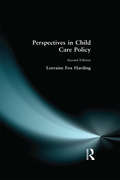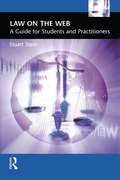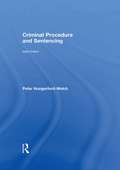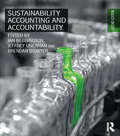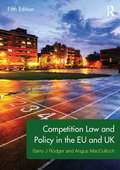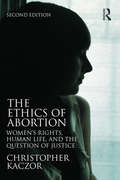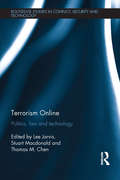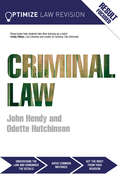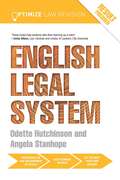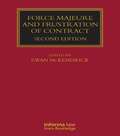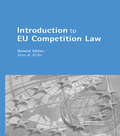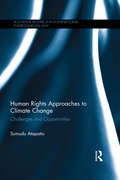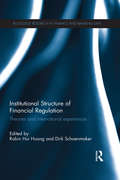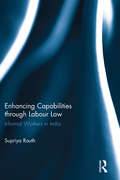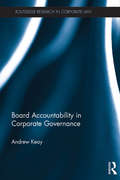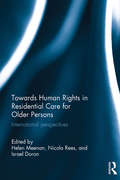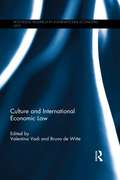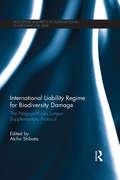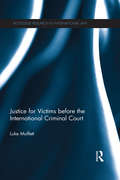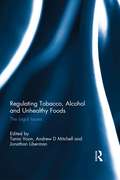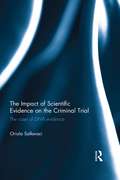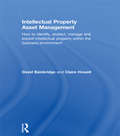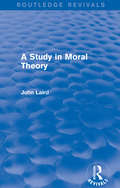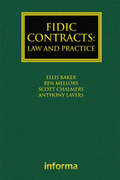- Table View
- List View
Perspectives in Child Care Policy
by Lorraine Fox HardingChild care law and policy issues generate very strong emotions and some crucial questions concerning the role of the state. For instance, under what circumstances should the state be able to intervene and use the force of the law to protect children? Do children have similar rights to adults? Such questions are matters of controversial debate and, in the light of well publicised child abuse cases, official inquiries and a government review led to the passing of the Children Act in 1989.Perspectives in Child Care Policy presents four different value perspectives on child care policy - laissez-faire; state paternalism; defence of the birth family and children's rights. These perspectives differ in their underlying values, concepts and assumptions concerning children, families, the rights and powers of parents and the role of the state.
Law on the Web: A Guide for Students and Practitioners
by Stuart SteinLaw on the Web is ideal for anyone who wants to access Law Internet resources quickly and efficiently without becoming an IT expert. The emphasis throughout is on the location of high quality law Internet resources for learning, teaching and research, from among the billions of publicly accessible Web pages.The book is structured so that it will be found useful by both beginners and intermediate level users, and be of continuing use over the course of higher education studies.In addition to extensive coverage on locating files and Web sites, Part III provides a substantial and annotated list of high quality resources for law students.
Family Law
by Frances BurtonFamily Law provides a comprehensive foundation in the key topics covered by courses. It explains the basic principles of the law and practice in their social, economic and historic context, enabling the reader to understand the doctrinal and practical impact of current radical changes in family law in response to cultural and other influences. This second edition has been fully updated in the light of on-going changes to the family justice system including: the modernisation of family justice including the new Family Court Atypical formation of the contemporary family: genetic, adoptive, social or through HAR the proposed administrative extra-judicial divorce process financial orders on married and unmarried family relationship breakdown enhanced parental responsibility, ‘Parental Agreements’ and ‘Child Arrangement Orders’ the treatment of post separation parenting (and the new DWP child support system) reforms to public child law, including changes to adoption same-sex marriage and the impact on traditional marriage and cohabitation Visit the companion website for practice questions, updates to the law and podcasts by the author at http://www.routledge.com/cw/burton-9780415583640
Criminal Procedure and Sentencing
by Peter Hungerford-WelchCriminal Procedure & Sentencing provides a comprehensive, engaging and up-to-date guide to each step of criminal procedure, from the arrest of the suspect through to trial, sentencing and appeals. Taking a strong practical focus throughout, it covers all aspects of the criminal justice system and sentencing and has been thoroughly revised and updated in the light of changes to the funding of legal aid and widespread changes to the legal system. The 8th edition focuses on a thorough explanation of the law and offers a clear and comprehensive account of amendments to the Criminal Procedure Rules and the implications of the Legal Aid, Sentencing and Punishment of Offenders Act 2012 as well as recent case law. The author also considers alternatives to prosecution as well as important developments in sentencing, including the creation of the Sentencing Council by the Coroners and Justice Act 2009 and recent key Court of Appeal decisions affecting sentencing procedure and sentencing principles. The author’s authoritative yet engaging writing style brings the subject to life and helps to explain complex issues in an easy-to-understand way. With a helpful glossary as well as suggestions for further reading at the end of each chapter, this is an ideal text for anyone with an interest in the criminal justice system. The supporting website offers readers access to regular updates to the law but also a comprehensive set of web links and advice on additional reading and research for those seeking to engage in critical evaluation of the criminal justice system.
Sustainability Accounting and Accountability
by Jan Bebbington Jeffrey Unerman Brendan O'DwyerThe management and balancing of social, environmental and economic sustainability is one of the most complex and urgent challenges facing both private and public sector organizations today; with these challenges of sustainability posing many risks to, and many opportunities for, advancing the aims and performance of organizations. Accounting and accountability processes and practices provide key tools to help organizations to more effectively identify and manage the risks and opportunities of sustainability. Popular features from the first edition are retained, whilst recent developments in theory and practice are accounted for. New substantive chapters on water resource accounting, carbon accounting, and decision making have been introduced and the book continues to benefit from a host of expert contributors from around the world, including Jesse Dillard, Rob Gray, Craig Deegan. This comprehensive and authoritative textbook will continue to be a key resource for students of accounting and sustainability, as well as being a vital tool for researchers.
Competition Law and Policy in the EU and UK
by Barry Rodger Angus MacCullochCompetition Law and Policy in the EU and UK provides a focused guide to the main provisions and policies at issue in the EU and UK, including topics such as enforcement, abuse of dominance, anti-competitive agreements, cartels, mergers, and market investigations. The book’s contents are tailored to cover all major topics in competition law teaching, and the authors’ clear and accessible writing style offers an engaging and easy to follow overview of the subject for course use. The fifth edition provides a full update for this well-established title, presenting and contextualising the impact of key cases, as well as changes to enforcement practice, and at a legislative and institutional level. There are new, separate chapters in this edition on private enforcement and UK market investigations to reflect the increasing significance of these key areas of competition law practice. Competition Law and Policy in the EU and UK integrates useful pedagogical features to help clarify topics and reinforce important points: chapter overviews and summaries highlight the key points to take away from each chapter to structure student learning discussion questions facilitate self-testing and seminar discussions of the major issues covered in each chapter, to help reinforce understanding of these topics further reading lists additional resources in order to guide research and develop subject knowledge a new glossary provides succinct explanations of competition law terminology, ideal for those studying the topic for the first time Clear, focused and student-friendly, this title offers a comprehensive resource for students taking competition law courses, and is supported online by updates to the law offered on Angus MacCulloch’s blog, Who’s Competing (http://whoscompeting.wordpress.com/).
The Ethics of Abortion: Women’s Rights, Human Life, and the Question of Justice (Routledge Annals of Bioethics)
by Christopher KaczorAppealing to reason rather than religious belief, this book is the most comprehensive case against the choice of abortion yet published. This Second Edition of The Ethics of Abortion critically evaluates all the major grounds for denying fetal personhood, including the views of those who defend not only abortion but also post-birth abortion. It also provides several (non-theological) justifications for the conclusion that all human beings, including those in utero, should be respected as persons. This book also critiques the view that abortion is not wrong even if the human fetus is a person. The Ethics of Abortion examines hard cases for those who are prolife, such as abortion in cases of rape or in order to save the mother’s life, as well as hard cases for defenders of abortion, such as sex selection abortion and the rationale for being "personally opposed" but publically supportive of abortion. It concludes with a discussion of whether artificial wombs might end the abortion debate. Answering the arguments of defenders of abortion, this book provides reasoned justification for the view that all intentional abortions are ethically wrong and that doctors and nurses who object to abortion should not be forced to act against their consciences. Updates and Revisions to the Second Edition include: -A response to Alberto Giubilini’s and Francesca Minerva’s now famous 2012 article, "After-Birth Abortion" in the Journal of Medical Ethics -Responses to new defenses of Judith Jarvis Thomson’s violinist argument -The addition of a new chapter on gradualist views of fetal moral worth, including Jeff McMahan’s Time-Relative Interest Account -The addition of a new chapter on the conscience protection for health care workers who are opposed to abortion -Responses to many critiques of the first edition, including those made by Donald Marquis, David DeGrazia, and William E. May
Terrorism Online: Politics, Law and Technology (Routledge Studies in Conflict, Security and Technology)
by Lee Jarvis Stuart MacDonald Thomas M. ChenThis book investigates the intersection of terrorism, digital technologies and cyberspace. The evolving field of cyber-terrorism research is dominated by single-perspective, technological, political, or sociological texts. In contrast, Terrorism Online uses a multi-disciplinary framework to provide a broader introduction to debates and developments that have largely been conducted in isolation. Drawing together key academics from a range of disciplinary fields, including Computer Science, Engineering, Social Psychology, International Relations, Law and Politics, the volume focuses on three broad themes: 1) how – and why – do terrorists engage with the Internet, digital technologies and cyberspace?; 2) what threat do these various activities pose, and to whom?; 3) how might these activities be prevented, deterred or addressed? Exploring these themes, the book engages with a range of contemporary case studies and different forms of terrorism: from lone-actor terrorists and protest activities associated with ‘hacktivist’ groups to state-based terrorism. Through the book’s engagement with questions of law, politics, technology and beyond, the volume offers a holistic approach to cyberterrorism which provides a unique and invaluable contribution to this subject matter. This book will be of great interest to students of cybersecurity, security studies, terrorism and International Relations.
Optimize Criminal Law (Optimize)
by John Hendy Odette HutchinsonThe Optimize series is designed to show you how to apply your knowledge in assessment. These concise revision guides cover the most commonly taught topics, and provide you with the tools to: Understand the law and remember the details · using diagrams and tables throughout to demonstrate how the law fits together Contextualise your knowledge · identifying and explaining how to apply legal principles for important cases · providing revision advise to help you aim higher in essays and exams Avoid common misunderstandings and errors · identifying common pitfalls students encounter in class and in assessment Reflect critically on the law · identifying contentious areas that are up for debate and on which you will need to form an opinion Apply what you have learned in assessment · presenting learning objectives that reflect typical assessment criteria · providing sample essay and exam questions, supported by end-of-chapter feedback The series is also supported by comprehensive online resources that allow you to track your progress during the run-up to exams. www.routledge.com/cw/optimizelawrevision
Optimize English Legal System: Optimize English Legal System (Optimize)
by Angela Stanhope Odette Hutchinson‘[Optimize is] ideal for undergraduate students at all levels. The content is of a high standard, easy to read and understand. The materials are very catching and easy on the eye making it easy to read and digest the materials…an essential study tool for all law students' - George Ellison, Derby ‘I am really impressed…the strengths are the user friendly format, clear explanations, helpful diagrams/flowcharts and appropriate suggestions for analysing the issues concerned’ - Katherine Davies, Northumbria The Optimize series is designed to show you how to apply your knowledge in assessment. These concise revision guides cover the most commonly taught topics, and provide you with the tools to: Understand the law and remember the details o using diagrams and tables throughout to demonstrate how the law fits together Contextualise your knowledge o identifying and explaining how to apply legal principles for important cases o providing revision advice to help you aim higher in essays and exams Avoid common misunderstandings and errors o identifying common pitfalls students encounter in class and in assessment Reflect critically on the law o identifying contentious areas that are up for debate and on which you will need to form an opinion Apply what you have learned in assessment o presenting learning objectives that reflect typical assessment criteria o providing sample essay and exam questions, supported by end-of chapter feedback The series is also supported by comprehensive online resources that allow you to test your progress during the run-up to exams. URL: www.routledge.com/cw/optimizelawrevision/
Force Majeure and Frustration of Contract (Lloyd's Commercial Law Library)
by Ewan McKendrickThis updated edition includes an examination of force majeure in French law, the drafting of force majeure clauses, its usage in shipbuilding contracts, and the application of commercial impracticality under article 2-165 of the Uniform Commercial Code.
Introduction to EU Competition Law
by Peter WillisThis book provides an introductory but thorough guide to EU competition law, covering the underlying economics, and the key substantive areas of anticompetitive agreements (Article 81), abuses of dominance (Article 82), the application to the most common types of commercial agreement, state aids, state measures limiting competition and mergers. It also examines the procedures under which the relevant competition authorities apply the rules, private enforcement of the rules before the courts, and minimising risk by implementing a compliance programme. The emphasis is practical rather than theoretical: the authors are practitioners in the field of competition law and economics, with many years’ individual and collective experience in the area. This will be an essential reference tool for practitioners, academics and students of EU Competition Law.
Human Rights Approaches to Climate Change: Challenges and Opportunities (Routledge Research in International Environmental Law)
by Sumudu AtapattuDespite the clear link between climate change and human rights with the potential for virtually all protected rights to be undermined as a result of climate change, its catastrophic impact on human beings was not really understood as a human rights issue until recently. This book examines the link between climate change and human rights in a comprehensive manner. It looks at human rights approaches to climate change, including the jurisprudential bases for human rights and the environment, the theoretical framework governing human rights and the environment, and the different approaches to this including benchmarks. In addition to a discussion of human rights implications of international environmental law principles in the climate change regime, the book explores how the human rights framework can be used in relation to mitigation, adaption, and adjudication. Other chapters examine how vulnerable groups –women, indigenous peoples and climate "refugees" – would be disproportionately affected by climate change. The book then goes on to discuss a new category of people created by climate change, those who will be rendered stateless as a result of states disappearing and displaced by climate change, and whether human rights law can adequately address these emerging issues.
Institutional Structure of Financial Regulation: Theories and International Experiences (Routledge Research in Finance and Banking Law)
by Robin Hui Huang Dirk SchoenmakerIn light of on-going global financial crises, the institutional structure of financial regulation is currently a subject of significant academic and practical interest. The financial crisis has called into question the adequacy of financial regulation at the national and supranational levels, and has instigated financial regulatory reforms in major markets overseas. This has included the enactment of the Dodd-Frank Act in the US, and the programme to split the Financial Services Authority in the UK. This book examines the institutional structure reform of financial regulation from a comparative perspective, exploring both fundamental theories and international experiences. The book explores the three main institutional structures of financial regulation in the world; the sectors-based model, adopted in the US, Mainland China and Hong Kong; the twin-peaks model with Australia and the Netherlands as its pioneers; and the single-regulator model as represented by the former Financial Services Authority in the UK and the Financial Services Agency in Japan. The book contains contributions from renowned experts in the field of financial regulation including Douglas Arner, Jeffrey Carmichael, Robin Hui Huang, Dirk Schoenmaker, and Michael Taylor, and will be of interest to students and researchers of banking and finance law, and comparative economics.
Enhancing Capabilities through Labour Law: Informal Workers in India
by Supriya RouthIn 2002 the International Labour Organization issued a report titled ‘Decent work and the informal economy’ in which it stressed the need to ensure appropriate employment and income, rights at work, and effective social protection in informal economic activities. Such a call by the ILO is urgent in the context of countries such as India, where the majority of workers are engaged in informal economic activities, and where expansion of informal economic activities is coupled with deteriorating working conditions and living standards. This book explores the informal economic activity of India as a case study to examine typical requirements in the work-lives of informal workers, and to develop a means to institutionalise the promotion of these requirements through labour law. Drawing upon Amartya Sen’s theoretical outlook, the book considers whether a capability approach to human development may be able to promote recognition and work-life conditions of a specific category of informal workers in India by integrating specific informal workers within a social dialogue framework along with a range of other social partners including state and non-state institutions. While examining the viability of a human development based labour law in an Indian context, the book also indicates how the proposals put forth in the book may be relevant for informal workers in other developing countries. This research monograph will be of great interest to scholars of labour law, informal work and workers, law and development, social justice, and labour studies.
Board Accountability in Corporate Governance (Routledge Research in Corporate Law)
by Andrew KeayWithin corporate governance the accountability of the board of directors is identified as a major issue by governments, international bodies, professional associations and academic literature. Boards are given significant power in companies, and as a consequence it is argued that they should be accountable for their actions. Drawing on political science, public administration, accounting, and ethics literature, this book examines the concept of accountability and its meaning in the corporate governance context. It examines the rationale for making boards accountable, and outlines the obstacles and drawbacks involved in providing for accountability. The book goes on to examine how current mechanisms for ensuring accountability are assessed in terms of fairness, justice, transparency, practicality, effectiveness and efficiency, before discussing the ways that accountability might be improved. Andrew Keay argues that enhanced accountability can provide better corporate governance, helping to reduce the frequency and severity of financial crises, and improve confidence in company practice. As an in depth study of a key element within the exercise of authority and management in corporate entities, this book will be of great use and interest to researchers and students of corporate governance, business and management, and corporate social responsibility.
Towards Human Rights in Residential Care for Older Persons: International Perspectives (Routledge Research in Human Rights Law)
by Helen Meenan Nicola Rees Israel DoronPeople are leading significantly longer lives than previous generations did, and the proportion of older people in the population is growing. Residential care for older people will become increasingly necessary as our society ages and, we will require more of it. At this moment in time, the rights of older people receive attention at international and regional levels, with the United Nations, the Organization of American States and the African Union exploring the possibility of establishing new conventions for the rights of older persons. This book explores the rights of older people and their quality of care once they are living in a care home, and considers how we can commence the journey towards a human rights framework to ensure decent and dignified care for older people. The book takes a comparative approach to present and future challenges facing the care home sector for older people in Africa (Kenya), the Arab world (Egypt), Australia, China, England, Israel, Japan and the USA. An international panel of experts have contributed chapters, identifying how their particular society cares for its older and oldest people, the extent to which demographic and economic change has placed their system under pressure and the role that residential elder care homes play in their culture. The book also explores the extent to which constitutional or other rights form a foundation to the regulatory and legislative structures to residential elder care and it examines the important concept of dignity. As a multi-regional study of the care of older person from a human rights perspective, this book will be of excellent use and interest, in particular to students and researchers of family and welfare law, long-term care, social policy, social work, human rights and elder law.
Culture and International Economic Law (Routledge Research in International Economic Law)
by Valentina Vadi Bruno De WitteGlobalization and international economic governance offer unprecedented opportunities for cultural exchange. Foreign direct investments can promote cultural diversity and provide the funds needed to locate, recover and preserve cultural heritage. Nonetheless, globalization and international economic governance can also jeopardize cultural diversity and determine the erosion of the cultural wealth of nations. Has an international economic culture emerged that emphasizes productivity and economic development at the expense of the common wealth? This book explores the ‘clash of cultures’ between international law and international cultural law, and asks whether States can promote economic development without infringing their cultural wealth. The book contains original chapters by experts in the field. Key issues include how international courts and tribunals are adjudicating culture–related cases; the interplay between indigenous peoples' rights and economic globalization; and the relationships between culture, human rights, and economic activities. The book will be of great interest and use to researchers and students of international trade law, cultural heritage law, and public international law.
International Liability Regime for Biodiversity Damage: The Nagoya-Kuala Lumpur Supplementary Protocol (Routledge Research in International Environmental Law)
by Akiho ShibataThe Nagoya-Kuala Lumpur Supplementary Protocol on Liability and Redress to the Cartagena Protocol on Biosafety, adopted on 15 October 2010 in Nagoya, Japan, provides an international liability regime for biodiversity damage caused by living modified organisms (LMOs). Its adoption marks a significant development in the legal design for international environmental liability regimes, as it incorporates for the first time in global treaties an administrative approach to liability. This book examines the Supplementary Protocol from both practitioner and academic perspectives. In its three parts the book explores the historical development, legal significances, and future implementation of the core provisions of the Supplementary Protocol, focusing specifically on its incorporation of an administrative approach to liability for biodiversity damage and its relation to civil liability. Contributors to the volume include Co-Chairs of the negotiating group and the negotiators and advisors from some of the key negotiating Parties, offering valuable insights into the difficult-to-read provisions of the Supplementary Protocol. The book demonstrates the significant changes in the political configuration of environmental treaty negotiations which have come about in the twenty-first century, and argues that the liability approach of the Supplementary Protocol has important implications for future development of international liability regimes under international environmental law.
Justice for Victims before the International Criminal Court (Routledge Research in International Law)
by Luke MoffettMany prosecutors and commentators have praised the victim provisions at the International Criminal Court (ICC) as 'justice for victims', which for the first time include participation, protection and reparations. This book critically examines the role of victims in international criminal justice, drawing from human rights, victimology, and best practices in transitional justice. Drawing on field research in Northern Uganda, Luke Moffet explores the nature of international crimes and assesses the role of victims in the proceedings of the ICC, paying particular attention to their recognition, participation, reparations and protection. The book argues that because of the criminal nature and structural limitations of the ICC, justice for victims is symbolic, requiring State Parties to complement the work of the Court to address victims' needs. In advancing an innovative theory of justice for victims, and in offering solutions to current challenges, the book will be of great interest and use to academics, practitioners and students engaged in victimology, the ICC, transitional justice, or reparations.
Regulating Tobacco, Alcohol and Unhealthy Foods: The Legal Issues
by Tania Voon Andrew D. Mitchell Jonathan LibermanThe need to reduce disability and premature deaths from non-communicable diseases (NCDs) is increasingly engaging international organisations and national and sub-national governments. In this book, experts from a range of backgrounds provide insights into the legal implications of regulating tobacco, alcohol and unhealthy foods, all of which are risk factors for NCDs. As individual countries and the international community move to increase targeting of these risk factors, affected industries are turning to national and international law to challenge the resulting regulations. This book explores how the effective regulation of tobacco, alcohol and unhealthy foods can be achieved within the context of international health law, international trade and investment law, international human rights law, international intellectual property law, and domestic laws on constitutional and other matters. Its contributors consider the various tensions that arise in regulating NCD risk factors, as well as offering an original analysis of the relationship between evidence and health regulation. Covering a range of geographical areas, including the Americas, the European Union, Africa and Oceania, the book offers lessons for health and policy practitioners and scholars in navigating the complex legal fields in which the regulation of tobacco, alcohol and unhealthy foods takes place.
The Impact of Scientific Evidence on the Criminal Trial: The Case of DNA Evidence
by Oriola SallavaciThis book explores challenges posed by the use of DNA evidence to the traditional features, procedures and principles of the criminal trial. It examines the limitations of existing theories of criminal trial processes in the face of increasing use of scientific evidence in the court room. The research elucidates the interconnections at trial of three epistemologies, namely legal reasoning, as represented by counsel and trial judge, common sense manifested by the jury and scientific reasoning expounded by the expert witness. Sallavaci argues that while scientific reasoning is part of this hybrid of trial languages and practices, its extended use is producing specifically novel tensions which impact on the traditional criminal trial landscape. Through the lens of DNA evidence, the book investigates how far the use of scientific evidence in the fact finding process poses challenges for the adversarial character of the proceedings and rules of evidence; how it affects the role of the judge, jury and expert witness, as well as the principle of orality and continuity of the trial. In comparing the challenges faced in English common law trials to those of the USA, this book has international scope, and will be of great use and interest to students and researchers of Criminal Law and Practice, Policing, and the role of Forensics in Law.
Intellectual Property Asset Management: How to identify, protect, manage and exploit intellectual property within the business environment
by Claire Howell David BainbridgeIn the new ‘knowledge-intensive economies’ Intellectual assets increasingly play a key part on balance sheets. There is an increasing global awareness that in order to promote innovation and the growth of the economy, businesses must fully recognise and exploit their intellectual assets. A company’s ability to innovate rapidly and successfully is now regarded as essential and most breakthroughs are made by Small and Medium-sized Enterprises (SMEs), usually with no in-house legal professionals to help them. It is essential that those working with or creating intellectual property rights (IPR) are aware of the basics of Intellectual Property Law. Intellectual Property Asset Management provides business and management students at all levels with an accessible-straight-forward explanation of what the main Intellectual Property rights are and how these rights are protected. Locating the subject squarely in a business context and using case studies and examples throughout drawn from a wide range of business organisations, it explains how an organisation can exploit their rights through licensing, franchising and other means in order to make the best possible use of their IP assets. This book will provide students with:• the basic Intellectual Property law knowledge needed to identify a potential IP issue• the tools and understanding to assess an IP breach• the ability to identify where the problem cannot be solved in house and where expert legal assistance is required • the knowledge required to work effectively with lawyers and other legal professionals to achieve the desired outcome
A Study in Moral Theory (Routledge Revivals)
by John LairdFirst published in 1926, this study addresses the theory of morality using four overarching approaches: analytical, psychological, theoretical, and finally, philosophical. Within these methodologies, chapters explore such areas as the character of moral enquiry, the knowledge of good and evil, freedom and self-determination and moral philosophy. This is an interesting reissue, which will be of particular value to students researching the philosophy of ethics and morality.
FIDIC Contracts: Law and Practice (Construction Practice Series)
by Ellis Baker Ben Mellors Scott Chalmers Anthony LaversFIDIC Contracts: Law and Practice is sure to become the leading industry standard guide to using the FIDIC forms, and is the only book to date which deals with the whole suites of contracts, including the new gold book for Design, Build and Operate projects. The White & Case work is outstanding in its detailed consideration and treatment of the legal aspects of the interpretation and application of the Conditions, touching on many points that most people would not have encountered. Humphrey LLoyd, International Construction Law Review [2010] ICLR 386
